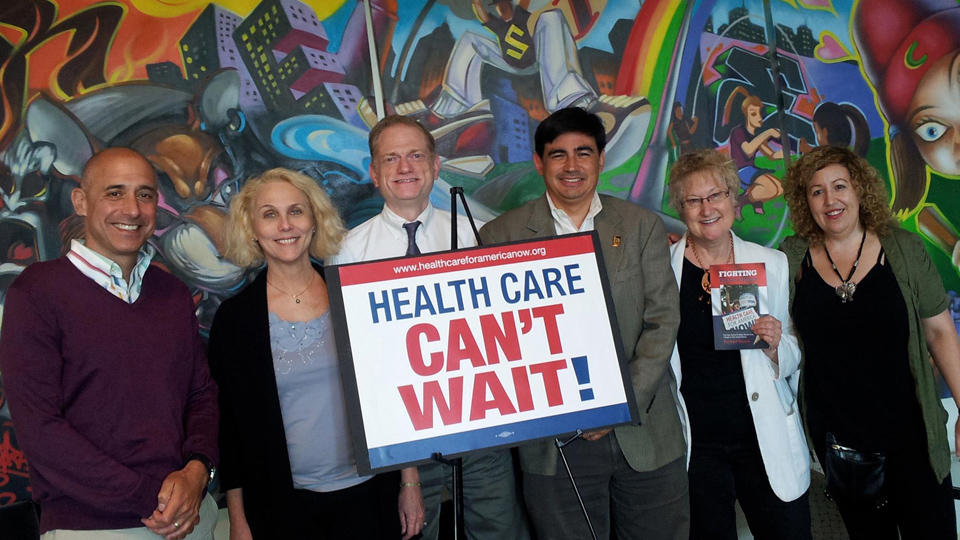
In the wake of the Trump administration and Republican-led Congress’ relentless assault on the Affordable Care Act, California continues to be a leader in efforts to preserve the benefits of Obamacare.
Covered California – the state-run health insurance marketplace serving people who need to buy their coverage on an individual basis – has announced it must raise statewide average rates next year by an average of nearly 9 percent.
Rates will go up by an average of 8.7 percent both for those buying insurance through Covered California, and for those buying in the individual market, if they keep the same plan for 2019. The proposed rates were filed with regulators July 19 and are subject to their final review.
Covered California said about 40 percent of the increase results from Congress’ ending the individual mandate – the requirement that almost everyone have comprehensive health insurance or pay a tax penalty.
“Covered California continues to benefit millions of people in our state by giving them access to high-quality, affordable health coverage,” the exchange’s director, Peter Lee, said July 19 as he announced the changes. “It is unfortunate,” he said, “when a rate change of nearly 9 percent is viewed as good news, when the rate change could – and should – have been much lower.”
About 1.2 million people who bought coverage through Covered California will pay the full cost, Lee said, while another 1.1 million who receive subsidies because of their lower incomes will see a rate hike of about 6 percent.
In a July 20 blog post, the Health Access coalition’s communications director, Rachel Linn Gish, pointed out that the premium hike is actually lower than that expected in other states, “due to legislative and administrative steps California has taken to shield consumers from the brunt of these attacks.”
Health Access has posted a fact sheet citing other steps the Trump administration has taken to undo the ACA, including slashing funds for federal marketplace outreach, cutting the open enrollment period from 90 to 45 days, and creating uncertainties that discouraged some insurers.
“In response,” the coalition says, “California has taken extraordinary actions to protect its residents and our health care system” so consumers can keep their coverage without big price hikes and also keep markets “stable and competitive.” These include stepped up spending on outreach and enrollment, keeping the 90-day open enrollment period and keeping all 11 current insurers in the market for next year.
Ever since the Affordable Care Act came fully into effect in 2014, California has been a leader in making affordable health care available to millions in the state.
Obamacare’s individual mandate – its requirement that everyone must have health insurance of some kind – helped to make sure its pool of participants included healthier as well as less healthy people.
The ACA also gave states the option to expand Medicaid programs serving those with limited incomes, and California used that opportunity to greatly expand access to its Medi-Cal program. As a result, last year over 13 million Californians, or about a third of the state’s population and 60 percent of its children – were covered by Medi-Cal.
Covered California says the two programs, together, have helped California reduce its uninsured rate from 17 percent at the end of 2013 to a record low of 6.8 percent at the end of 2017.
Besides the end of the individual mandate, other factors contributing to the rising cost of individual coverage include overall increases in the cost of medical services and products.
Covered California also says removing the individual mandate penalty could result in some 262,000 people currently covered dropping their coverage next year.
In an attempt to get around the ACA’s comprehensive marketplace standards that protect consumers, President Trump last month signed an executive order promoting “junk insurance,” destabilizing individual and small-group markets and undermining protections for people with pre-existing conditions. The order also directs federal agencies to change federal rules to expand short-term “association” insurance plans, to get around the ACA’s consumer protections.
 In response, Health Access is calling on the California legislature to pass two bills by state Senator Ed Hernandez, D-W. Covina, who chairs the state Senate’s Committee on Health.
In response, Health Access is calling on the California legislature to pass two bills by state Senator Ed Hernandez, D-W. Covina, who chairs the state Senate’s Committee on Health.
Hernandez’ bills – Senate Bills 910 and 1375 – would ban the junk insurance in California and ensure that the “association” plans meet Obamacare standards.
Health Access also warns that despite the state’s efforts to minimize damage from “Trump’s deliberately destructive and destabilizing federal actions,” millions of Californians still risk losing affordable coverage because of Congressional actions.
“If we can keep Medicaid, Medicare, and the framework and financing of the ACA intact,” the coalition says, “California has so far demonstrated the will and the wherewithal to develop workarounds to protect consumers from Trump’s systemic sabotage of our health care system.”
Like free stuff? So do we. Here at People’s World, we believe strongly in the mission of keeping the labor and democratic movements informed so they are prepared for the struggle. But we need your help. While our content is free for readers (something we are proud of) it takes money — a lot of it — to produce and cover the stories you see in our pages. Only you, our readers and supporters, can keep us going. Only you can make sure we keep the news that matters free of paywalls and advertisements. If you enjoy reading People’s World and the stories we bring you, support our work by becoming a $5 monthly sustainer today.












Comments